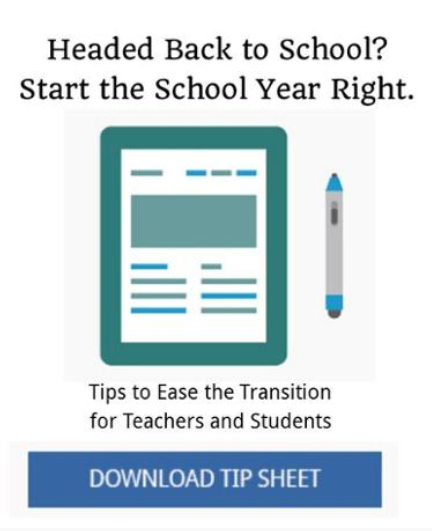For manypeoplehere in Minnesota, the State Fair, held over a 10-day span through Labor Day,is one of the most anticipated events of the year: hotdish on a stick, deep-friedcandy bars, the Miracle of Birth Center (baby farm animals), people watching…what’s not to love?!Add the final gasps of summer weather, changing leaves, evening bonfires, and apple orchards, and it’s a beautiful parade of all things autumn.However, formany years, I have greeted that seasonwithanxious feelings surroundingmysummer vacation coming to an end and returning toschool.
Even after 14 years of teaching, I still experienced the “back to school jitters” every fall. Irecallthosefeelings(a combination of nerves and excitement)as a child, an adolescent, and as a college student,even though Ilovedschool.I’m not alone. When I Googled ‘back to school jitters’, there were 16 million hits!Many children, teens, parents, and teachers feel anxious about the unknowns of another school year. Thankfully for most, those jittersdissipateonce we get back into the swing of things.
One strategy that helped my students and me transition from summer to fall wasby acknowledging our thoughts and feelingsthrough writing.Writing can help usorganize our thoughts byidentifyingwhat we fear the most.Often times,our fearsand concernslose intensityonce they’re written down on paper.
As an elementary special education teacher, working mainly with students with learning disabilities, I wanted to support my students by listening to what they were thinking and how they were feeling about returning to school, while nurturing their writing skills. Because many of them struggled with writing, I didn’t want to cause more anxiety by having them write about a topic that alreadyhad their little stomachstied in knots.
So, I createdthisguidedwriting activity using the prompt,“Goodbye, Summer! Hello, Fall!”. Starting with brainstorming, this supported writing activity guides students with writing a 6-sentence narrative. (Also included is a sample narrative for your reference.)This specific activity is based on third grade Common Core State Standards, but I used it with my students with special needsup to grade five. For younger students, this activity could be modified to include drawing picturesrelated to summer and fallwith 1-2 correspondingsentences. Afriend of mine, who is a middle schoolspecial educationteacher,modifiedthis activityto includewritingasix-paragraph narrative.
While I will probably always associate our state fairand the changing leaveswith returning to school, writing haseasedthe jitters for me.Acknowledging that change is difficult and focusing on the positivesof what’s aheadthrough writing has greatly benefited my students as well.I hope this example of guided writing will help you and your students have a smooth transition from summer to fall!
Looking for other ways to help yourself and your students transition back into the school year? Check out our Back to School Tip Sheet and start your school year right.
Have a great 2017-2018 school year!
Learners Edge is passionately committed to providing you with continuing education coursework, materials, and tools that will help you succeed in your classroom and in your career.
Offering more than 100 print-based or online courses for teachers, you can earn the graduate credit you need for salary advancement and meet your professional development needs. Contact us today to get started!







